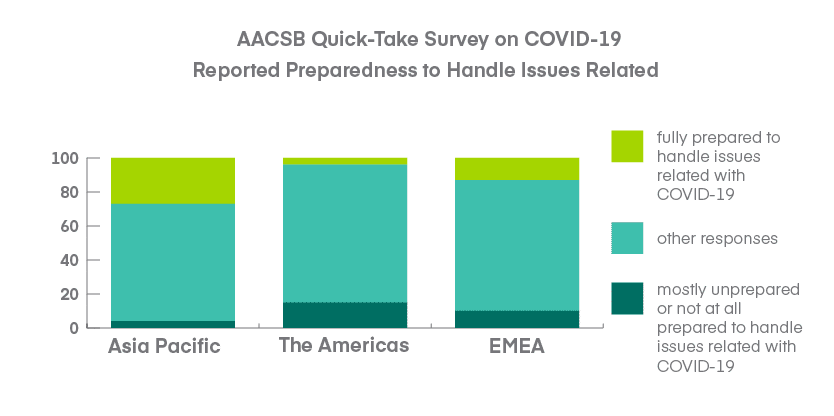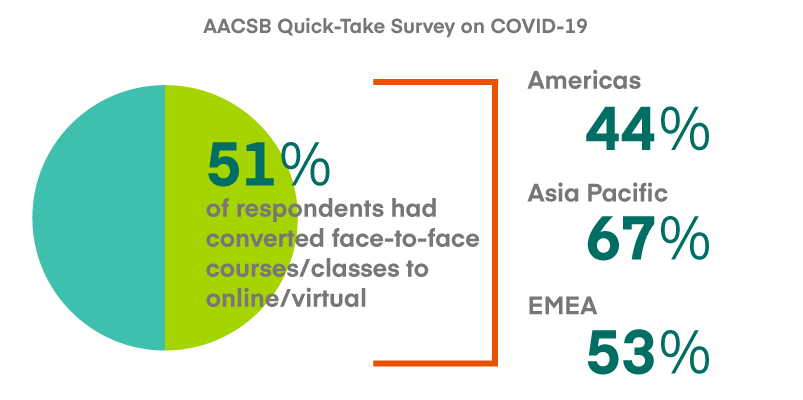Business schools around the world are likely to accelerate delivery of their digital offerings in the wake of the COVID-19 (Coronavirus) outbreak, according to a survey by AACSB.
While the immediate impacts of COVID-19 on higher education have been largely disruptive in a negative way, an AACSB survey of member schools were anticipating a “silver lining” to what they have been experiencing.
AACSB International (AACSB) is the world’s largest business education alliance and provides a range of business school accreditation and standardisation services. there are currently 10 business schools in Australia accredited by AACSB.
In the quick-take survey on COVID-19, AACSB asked business schools to describe any anticipated positive impacts of the actions they have been forced to take with the recent outbreak.
The most common potential positive outcome shared was that the school and/or university may further develop and expand its digital offerings.
“Many respondents shared that this event may encourage schools to rethink their faculty’s approach to online delivery of education, as well as their assessment of online learning,” AACSB said.
Some of the responses included;
The crisis will act as a burning platform to encourage more faculty to rethink their approach to technology and to see how it can be used to provide a more engaging student experience. It will also force us to consider alternative forms of online assessment.
The COVID-19 pandemic has perhaps accelerated the rate of change necessary to move the business school in the right direction, particularly with respect to the development of online and blended degree programs and short courses (micro-credentials).
If a professor carefully prepares his/her class for online lecture, these courses might be moved to online in the future to attract more students.
Hopefully [we] will avoid worst of the impact of COVID-19. Also, [we] will have more faculty exposed to teaching on-line which, if they have a good experience, may increase the variety of courses offered on-line in the future.
The impact on faculty’s role was mentioned throughout the survey, from how this event may influence hiring qualifications to include increased technological competency, to providing faculty with more resources, training, and support in effectively leveraging technology platforms in their teaching.
Several also noted that they might change remote-working policies, as well as rethink travel expectations if this experience proves that quality work can be delivered at a distance—which some viewed as potential for enhancing work-life balance.
About a tenth of responding individuals anticipated only negative or no positive residual impacts from the pandemic, indicating that the strain on the global economy could be far too great and contribute to the potential of scaling back on initiatives, staff, and strategic goals.
COVID Preparedness
The AACSB survey found Asia Pacific business schools were the best prepared to deal with the outbreak, with 27% of Asia Pacific respondents reported being fully prepared to handle issues related to COVID-19, versus 4% of respondents in the Americas and 13% in EMEA.
Of respondents who reported being mostly unprepared or not at all prepared, 15% are from the Americas, 10% from EMEA, and 4% from Asia Pacific.

The following actions have been taken by business school students.
- 24% of respondents had postponed courses/programs; 11% had canceled courses/programs
- 51% of respondents had converted face-to-face courses/classes to online/virtual; 67% of respondents in Asia Pacific had done so, 53% in EMEA, and 44% in the Americas
- 71% of respondents had canceled or postponed student travel (e.g., study abroad), with 77% in the Americas, 60% in EMEA, and 71% in Asia Pacific
- 7% of respondents had reduced expected intake of students for the current semester, with 18% of respondents in Asia Pacific, 7% in EMEA, and 3% in the Americas
- Across all regions, the most common action taken in response to reduced student intake is to defer enrolments to the next term.

Australian Business Schools Respond
Local business schools have moved quickly to adapt to the changing situation, with many campuses slowly shutting down over the last two weeks as part of social distancing requirements.
The shutdowns accelerated this week with stricter distancing requirements making on-campus classes almost impossible.
Top-ranked Melbourne Business School closed its Carlton campus on Monday and will move all teaching online.
“We’re committed to maintaining the highest quality learning experience for our students, using a wide range of interactive technology and our expertise in online learning design,” a spokesman said.
AGSM @ UNSW ceased all in-person classes on March 20.
Teachers will deliver MBA classes, where possible, by online or other means that can be accessed remotely. Students should access online teaching material remotely and participate by remote means.
“This is achievable for lectures and for many tutorials and discussions,” AGSM said in a note to students.
“In addition, steps are underway to convert some laboratory practicals to video demonstrations or other methods that can accessed remotely. Individual course convenors will inform you of details via Moodle or other means.”
At the University of Queensland all teaching activities have moved online , effective Monday March 23.
“This semester is going to be different for all us – but we are doing everything we can to make sure you can keep progressing with your study and make the most of this challenging situation,” UQ told students.







